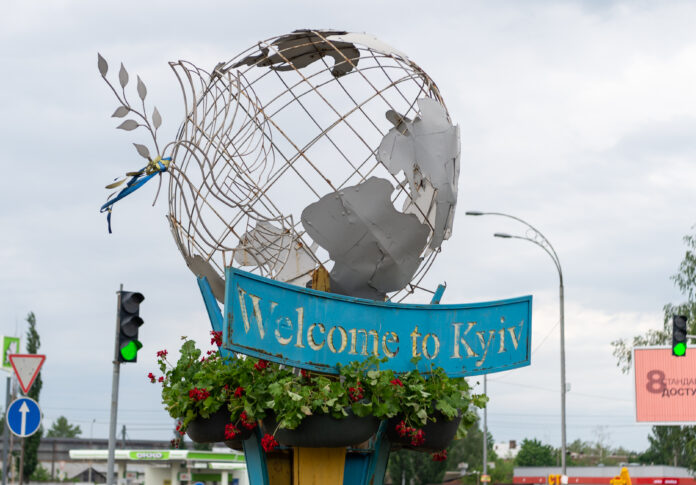You might have noticed people inadvertently saying it. You might even say it yourself.
But there’s an important reason why you shouldn’t be calling Ukraine ‘the Ukraine’ and it’s one that’s mired in a history of changing borders that dates back centuries.
“Ukraine appears firstly on English maps as ‘The Ukraine’ in the 16th and 17th centuries, when it was part of Poland,” says Dr. Frank Sysyn of the Canadian Institute of Ukrainian Studies at the University of Alberta.
“English picks up on that way of describing it and keeps it to the present.”
The definitive article is also associated with Soviet rule (when the area was known as the Ukrainian Soviet Socialist Republic), associations which Ukraine has been determined to shake since it became independent.
It’s why you might have noticed the western city of “Lvov” becoming “Lviv” and “Odessa”, the port city, becoming “Odesa.”
International media has been clarifying their stances on pronunciations and spellings of certain Ukrainian place names in recent weeks for the same reason: to avoid using Russian names or translations.
But Sysyn says the contention around “the Ukraine” far predates the Soviets.
“Ukraine really does in Slavic mean ‘borderland,’ but the term really comes into use not as the borderland of Russia but of the large Polish state,” he says.
Early world maps, in the 16th and 17th centuries, show “the Ukraine,” as it was known, as being partly in Poland and partly in modern-day Ukraine, Sysyn says.
Canada’s response to the Russian invasion of Ukraine
It kept the definitive article when the area fell under the control of the Soviet Union, from 1922 until 1991, and became the Ukrainian Soviet Socialist Republic. But it kept the “the” because it was not an independent nation.
Other countries, such as Sudan and Lebanon, underwent a similar transformation before becoming independent entities, but successfully lost the “the” in common vernacular, Sysyn says.
“I cannot tell you that every language behaves in this way, but English has had a tendency to drop articles once a country is recognized,” Sysyn says.
When Ukraine became an independent country after the fall of the Soviet Union in 1991, the new government sought to assert its autonomy by eradicating Russian spellings and pronunciations, one by one.
Russia-Ukraine Crisis: The Road to Kyiv
The capital city, spelled “Kiev” in Russian and pronounced “Kee-yiv”, became officially known as “Kyiv” and pronounced “Kee-eve” with an order from the government in 1995.
Trending Stories
Ukraine orders full military mobilization to counter Russian invasion
Explosions rock Kyiv as Ukraine capital prepares for Russian assault
Sysyn says Ukrainian spellings changed faster than pronunciations because the Ukrainian government made official requests to the international community to adopt the change, too.
“So older people still say ‘the Ukraine’ but the Ukrainian community carried on an endless battle with every newspaper office in North America to get rid of the ‘the’,” Sysyn said.
“Above all, it was to emphasize that Ukraine is a country… and it is also associated with a mindset.”
Canadian expat Lee Reaney, editor of Lviv Today, the western city’s largest English language newspaper, says you’ll risk offending a local if you describe the country with a “the.”
“You take away their autonomy — [you’re saying] it’s a region of somewhere else, as opposed to the country in and of itself,” Reaney says.
“Russians like it when they hear ‘the Ukraine’ because the Ukraine would be part of the Soviet Union.”
However, Reaney, who is originally from Saskatoon, says within Ukraine, the definitive article has largely been dropped and it is “a fight that’s already been won.”
The onus now is for the international community to follow suit.
The debate on the spelling of place names in particular came to the fore again in 2014 during the invasion of Crimea and the Euromaidan uprising, when protests ousted pro-Russian leader Viktor Yanukovych, and transitioned the country to a more Western-facing democracy.
This led to the Ukrainian government’s #KyivNotKiev campaign in 2018, spearheaded by the Ukrainian Ministry for Foreign Affairs. This, in turn, led to major media outlets around the world adapting the new spelling and pronunciation.
“We’ve seen some successes with that one, in the sense that most foreign press have adopted Kyiv instead of Kiev,” Reaney says.
“That ones a little bit trickier because people grow up with it… and they hear it on old TV shows.”
Russia-Ukraine Crisis: What comes next?
Reaney says Ukrainian people will often forgive foreigners for mispronouncing the name, but says, “when you spell it , it really rankles Ukrainians.”
In recent days, media outlets around the world have released explanations as to why they’re pronouncing Ukrainian cities the way they are.
BBC reporter Rich Preston on Friday shared a notice on Twitter from the the BBC Pronunciation Unit, which showed the British broadcaster changed its spelling of Kiev to Kyiv, and its pronunciation, in 2019.
Global News has also chosen to use the Ukrainian spelling and pronunciation.
Merriam-Webster has gone one step further, though, and its page listing for “Kiev” now automatically takes people to the page for “Kyiv.” If you’re searching for the breaded chicken dish, however, you must search “chicken kiev.”
Of course, it’s important to note that there are instances in which countries have a “the” preceding their names and the above argument does not apply — the United States, the United Kingdom and the Philippines, for example. But these tend to be “collectives” or plurals, Sysyn says.
The United States is a collection of states, the United Kingdom is a sovereign state made up of four countries and the Philippines is a group of islands.
© 2022 Global News, a division of Corus Entertainment Inc.



